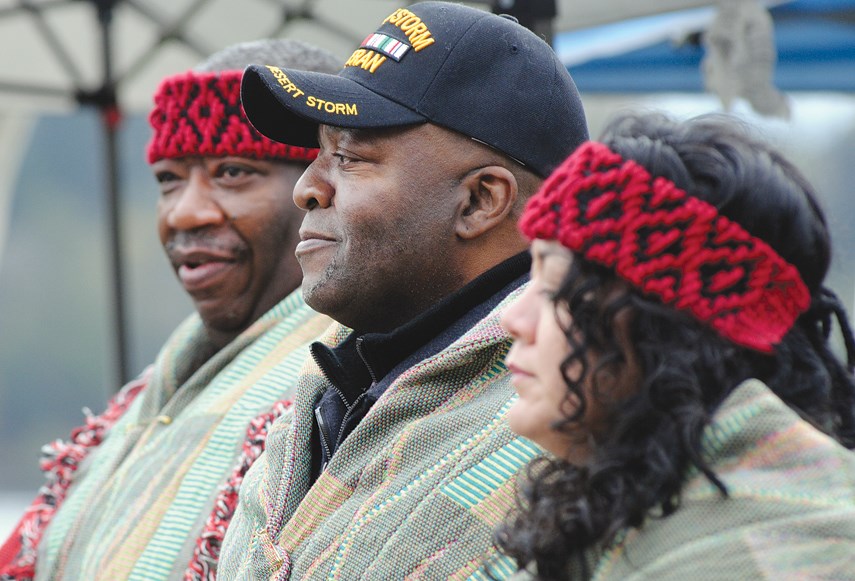In an effort to educate both Tsleil-Waututh Nation members and the public about the sacrifices Nation members have made serving in the military, Councillor Deanna George welcomed around 100 people to pay their respects to the Nation’s veterans, both past and present, at Whey-ah-wichen (Cates Park) on National Indigenous Veterans Day.
Cultural Manager and emcee for the event on Monday, William George-Thomas, noted during the Second World War, six men from the Nation were stationed overseas, something that had a great impact on the community.
“If you look at our community now, it’s so much larger than what it was in the 1930s and 1940s. Back then, there was barely more than 10 houses on Dollarton Street. So, for six of our members to go overseas to Europe between 1939 to 1944, [it] had a huge impact on our community,” he said.
“Our little community did as much as we could in the war efforts.”
According to Veterans Affairs Canada, an estimated 3,000 First Nations members, and an unknown number of Metis, Inuit, and other Indigenous members, served during the Second World War – a time when they were not considered citizens or allowed to vote.
Tsleil-Waututh Nation has now had 14 of its members serve in the military.
Honouring members in the way the Nation wanted, with the help of Kalila George-Wilson and Carlos Lopez, George-Thomas read the names, ranks, and ancestral and familial ties of the Tsleil-Waututh veterans.
Blanketed in the ceremony were living veterans: Celina Dorame, a veteran and descendent of William Thomas, a veteran of the Second World War; Michael Wilson, US Army veteran; and Dennis Owens, Navy veteran and now Tsleil-Waututh community bus driver.
"These blankets represent the love and respect for all of our veterans, for their courageous acts of duty, for traveling all the way across the world, for fighting for our freedoms, the quality of life that we're privileged to have today," George-Thomas explained.
“They've all either come back to our community, were married into our community from our Tsleil-Waututh women, and they all are very recognized community members, integral parts of our community,” George-Thomas said. “And even though traditionally, Veterans Day is celebrated for World War Two veterans, here for Indigenous Veterans Day and our Tsleil-Waututh, we wanted to honour our current veterans that are in our community here every day, and we want to honour and welcome them here."
For those service members who did not make it home, Tsleil-Waututh drummers performed a prayer song, as a form of medicine for the community.
Two students from the Tsleil-Waututh School read poems, one of which was written by respected Elder Mahara Albrett, the other, In Flanders Fields, by John McCrae.
The ceremony was capped by the Nation’s drummers, performing the victory song.
“As a small community, past and present, these are big victories … we did contribute a lot for what we had,” George-Thomas said.
Meanwhile, in a statement, B.C. Premier John Horgan said Indigenous people have a proud tradition of serving in the military, and despite “exemplary records of service and valour,” many have returned home to discrimination and mistreatment.
“On this sombre day of reflection, we remember those who never made it home. We also recognize those who returned home forever changed by conflict and acknowledge the sacrifice of their service.
"I encourage all British Columbians to take a moment today to reflect on the contributions of Indigenous veterans and today's active service members. Lest we forget," Horgan wrote.
Prime Minister Justin Trudeau noted Monday that although Remembrance Day acknowledges all who have served “our country,” Indigenous veterans have not always been treated fairly.
“On this day, we recognize Indigenous women and men from across this land who have a proud tradition of military service. They have risked their lives to protect and defend our shared values and fundamental freedoms and the liberty of our partners and allies,” Trudeau wrote in a statement.
“Indigenous veterans have a proud legacy of courage, service, and excellence in the Canadian Armed Forces that continues today with the more than 2,500 Indigenous men and women making a difference across Canada and abroad."
But the Union of British Columbia Indian Chiefs said in a statement Monday that post-war PTSD and Residential School System trauma continues to have "devastating, intergenerational impacts upon Indigenous families."
"It is imperative Canada acknowledges and rectifies the centuries of discrimination and injustices committed against Indigenous veterans."
Charlie Carey is the North Shore News’ Indigenous and civic affairs reporter. This reporting beat is made possible by the Local Journalism Initiative.



